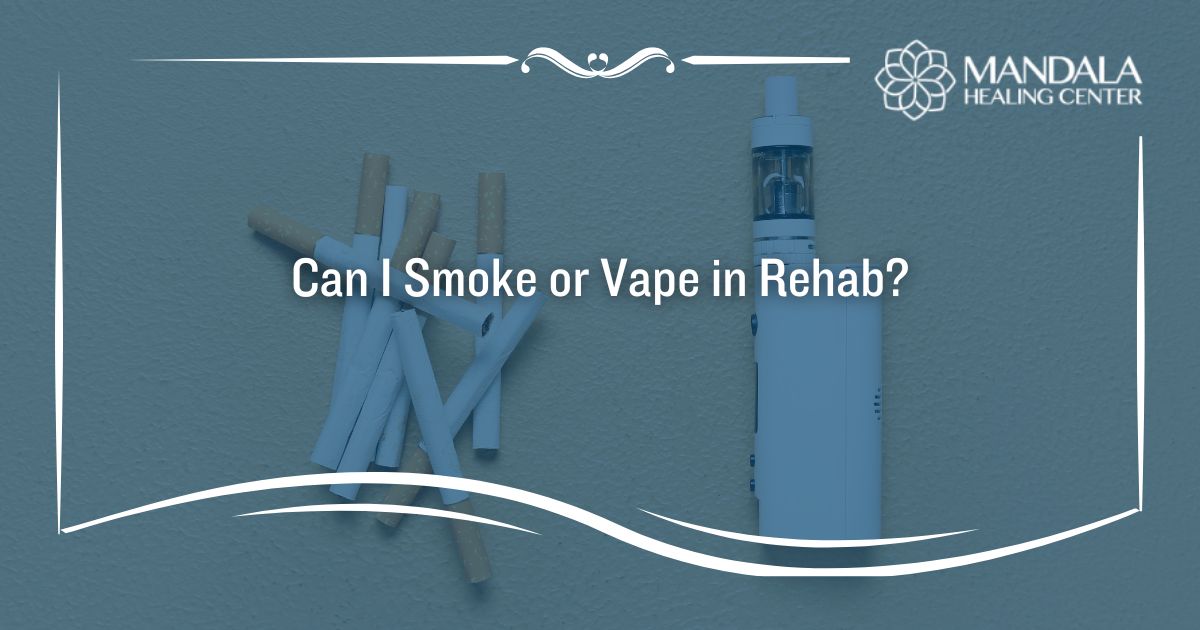If you struggle with drug and alcohol abuse, you are not alone. According to the Substance Abuse and Mental Health Services Administration (SAMHSA), 48.5 million people suffered from a substance use disorder in 2023.[1]
Attending an addiction treatment center is the best way to overcome drug and alcohol abuse. If you are considering entering rehab, you might want to know if you’ll be allowed to smoke cigarettes or vape. While it all comes down to the specific facility’s rules, most rehab facilities allow smoking and vaping because it can be difficult to quit while you are already recovering from drug addiction.
Even though vaping and cigarette smoking are usually permitted, you might want to consider quitting. You’ll have access to support from addiction and mental health experts, which means you’ll never have a better opportunity to stop. Additionally, some rehab centers might offer smoking cessation tools to their clients, like nicotine patches or gum.
If you are quitting nicotine during rehab, there are some coping mechanisms you can use to make the process easier. For example, you can use nicotine replacement therapy, make a plan to deal with triggers, distract yourself when you feel nicotine cravings, and use other coping mechanisms to deal with stress to replace cigarettes and vapes.
In this article, you will learn:
- Can you vape and smoke during rehab?
- Should you quit using nicotine during drug and alcohol addiction treatment?
- What are some tips to help you cope with quitting nicotine during rehab?
Are You Allowed to Vape and Smoke in Rehab?
Each addiction treatment facility will have its own set of rules. While some rehab centers prohibit smoking and vaping, others allow you to use nicotine during treatment. The treatment centers that allow nicotine use do so because they believe quitting nicotine while recovering from drug and alcohol abuse is a lot to deal with at once.
If your treatment program allows smoking, you’ll probably be expected to smoke or vape in a designated area. This ensures the cleanliness of the facility and prevents other clients from being bothered by the smell of cigarettes or vapes.
Should You Quit Nicotine During Treatment?
According to the National Institute on Drug Abuse (NIDA), 22% of people aged 12 or older used nicotine products in the past 30 days.[2]
As you can see, smoking and vaping addiction is common. However, just because a lot of people engage in the behavior does not mean it is safe. Long-term abuse of cigarettes or vapes can lead to lung cancer and other conditions like emphysema.
While quitting nicotine during addiction recovery can be difficult, it might be worth it. You’ll have access to addiction recovery experts, mental health support, and prescription nicotine replacement therapy. In other words, you’ll have the highest level of support you’ll find for quitting cigarettes and vaping.
If you are thinking about quitting smoking during treatment, you should talk it over with your therapist. They will help you evaluate whether it’s the right time to quit. The only reason they’d encourage you to wait is if they believe the withdrawal symptoms from quitting nicotine would trigger a relapse in your alcohol or drug addiction.
Tips for Coping With Quitting Nicotine During Rehab
Quitting nicotine during rehab can be difficult. If your therapist thinks you are ready to quit smoking cigarettes or vaping, there are some tools you can use to cope.
Tips for coping with quitting nicotine during rehab include:
- Use Nicotine Replacement Therapy – You can use nicotine patches, gum, lozenges, and even nose sprays to slowly taper yourself off of.
- Making Plans for Triggers – If you know you’ll be triggered to smoke a cigarette at a certain time, like after eating, make a plan for how to deal with your cravings ahead of time.
- Distracting Yourself – Nicotine cravings can be intense, but they do not last forever. If you find an activity to distract yourself during a craving, you’ll be able to cope with it easier.
- Give Your Mouth Something to Do – Sometimes the act of bringing a cigarette or vape to your mouth is a behavioral addiction. If you chew gum or suck on a mint, you might alleviate some of the cravings you experience.
- Engage in Physical Activity – Exercise can be a great way to deal with nicotine cravings, as it distracts you and provides a release of endorphins.
- Remind Yourself of the Benefits – While quitting nicotine can be hard, remembering why you are doing it can lessen the intensity of your cravings. Remember the benefits like being healthier, preventing cancer, and even smelling better.
- Reach Out for Support – If you are having a hard time coping with quitting nicotine, reach out to a therapist or loved one for support.
Get Connected to a Top-Rated Drug and Alcohol Rehab Center
Whether you plan on quitting nicotine or smoking during rehab, the Mandala Healing Center is here to help. We offer an individualized and evidence-based addiction treatment program that will provide you with the tools and support you need to achieve long-term sobriety.
Contact us today for more information on whether you can smoke cigarettes or vape during our rehab program.
References:
- The Substance Abuse and Mental Health Services Administration (SAMHSA): Highlights for the 2023 National Survey on Drug Use and Health
- The National Institute on Drug Abuse (NIDA): What is the scope of tobacco, nicotine, and e-cigarette use in the United States?
















